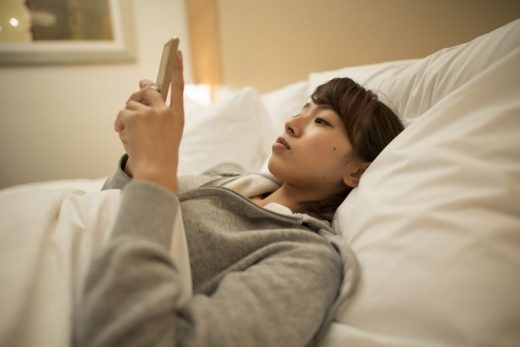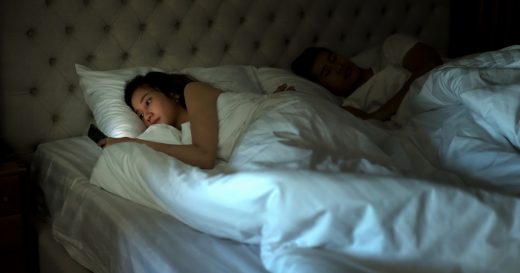Insomnia: Can you Control It Completely?
If you are having problems with your sleep patterns, a number of factors could be at play. One common factor that causes chronic sleep deprivation in millions of people is insomnia. Insomnia occurs more in adults than kids. Experiencing insomnia does not necessarily mean you have a medical condition but it could as well be a condition caused by other secondary factors. If you find it hard to sleep or have short sleep patterns, you definitely suffer from insomnia.

Persons experiencing insomnia may not be aware of it. This could trigger more complications that stem from the condition.
Causal Factorsand Remedies
Insomnia is triggered more often by secondary factors than other causal factors. However, other factors that accentuate insomnia include your hormonal levels, medical history or condition and psychological factors.
Hormones

With regard to hormonal levels, you could be having an imbalance of sleep hormones. This interferes with your body sleeping patterns causing you to lack the much-needed sleep. As it gets darker, your levels of melatonin hormone rise which catalyzes sleep. This is different in other people because of too much light in the room. Approximately close to 70 million Americans experience sleeping disorders associated with insomnia. In most cases, your sleep disturbances can be managed by a few changes in your behavior or lifestyle. Unfortunately for Insomnia, you will need a different approach in getting better. This is because insomnia can be caused by an undetected medical condition; which turns out to be chronic insomnia.
Interruption of circadian rhythm
One other type is commonly known as transient insomnia. It results from an unusual occurrence or event such as loss of a job or developing a physical health condition. Both chronic and transient insomnia lead to a change in your circadian rhythm. Blue light also interferes with your circadian rhythm.
Naturally, your body has been wired to regulate its sleep and wake cycles by using blue light from the sun. During the day, your body has less of the desire to sleep; blue light from the sun is sending the signal to your body to maintain the wake cycle. This is different at dusk because the sun is setting. Blue light isn’t available. Your body adjusts by moving into a sleep cycle.
The body’s sleep cycle is interrupted with artificial blue light emanating from your computer, tablet and phone. The artificial blue light disrupts your circadian rhythm; It sends the same message the body receives from sun’s blue light during daytime. This cuts off your sleep cycle and initiates a wake cycle. Your sleep pattern is interfered with as a result. Turn off your lights before sleep and ensure that there is no blue light coming out from your gadgets. Blue light exposure during the night causes low melatonin production. Disruption of your circadian rhythm follows.
Control blue light at night by using blue light filter apps you can find for free online. Alternatively, you could use computer glasses.
However, the use of blue light filter apps is also pegged on usability and user preference. Some users complain of reduced clarity and vision. This owes to the yellow or the orange light brought about by the filters. Heavy computer users are most likely to suffer excessive exposure of blue light. They should make informed choices for their light filter preferences.
Psychology issues

Your emotional health is important for good sleep. If you are emotionally unhealthy, feeling anxious, stressed or depressed is very common. You interfere with your sleep when in such a state of emotional well-being. For depression cases, visit a certified psychologist who may be of help in restoring your interest in life. You may have acquired feelings, thoughts and behaviors that cut short your sleep. A professional psychologist is better placed to advise you to handle your depression.
Interestingly, depression could be either a causal or a resultant factor of lack of sleep. Some people experience sleep disorders that lead to depression. For others depression causes them to lack that sleep.
Worth noting is the fact that your psychologist has to help you fully recover from the causal factors of your depression. Depression is a mental pattern that if not managed accordingly could recur and make the victim continue suffering the consequences. This includes lacking sleep.
Medical Conditions

Medical conditions are a big causal factor for lack of sleep. Only medical remedies can provide the needed relief to patients. Some of the medical conditions that lead to chronic lack of sleep include Alzheimer disease, congestive heart failure and pulmonary diseases. Paradoxically, enough sleep is recommended for the healthiness of your cardiovascular system. Past research has given credence the fact that both short-term and long-term sleep has the possibility of developing coronary artery disease. This leads to stroke. The recommended sleep time for adults is 6 to 8 hours. If you fall short of this, especially short-term sleep, you have 11% risk of contracting a heart disease. The risk is high for long- term sleepers at 33%. Sleeping for more than 8 hours also puts your heart at risk.
So, Is Insomnia treatable?

The answer to this question is dependent upon the causal factor that caused insomnia. For your circadian rhythm, watch your lifestyle habits by developing a sleeping routine that the body will adjust into. Transient insomnia often arises from your lifestyle habits. You need to consistently observe habits that will increase your sleep.
Final Thoughts
Your body is like a machine that needs to be well oiled and serviced. That means that for it to function optimally you have to put in place the right health measures. This is no different when it comes to insomnia. Put effort in making sure that you improve your sleep by cutting on naps, having a sleep schedule that your body can adjust into, avoid anxiety related topics before bedtime. Have regular medical checkups to make sure that your body is in a good health status always. If you manage to follow such good health habits, insomnia will be a thing of the past.



